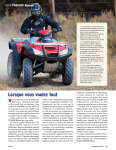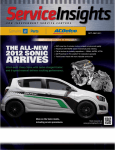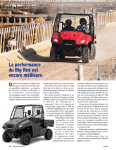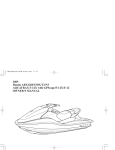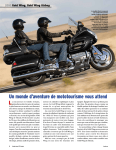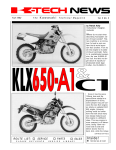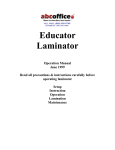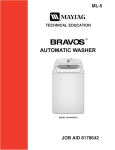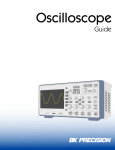Download PDF - Honda ATV
Transcript
2011 TRX680F Rincon >> The Rincon’s powerful 675 cc liquid-cooled engine sits with its crankshaft oriented longitudinally in the chassis so it points to the front and rear axles, eliminating the need for horsepower-robbing bevel gears and saving weight >> Light weight gives the Rincon an excellent power-to-weight ratio, which means its engine can outperform those of higher displacement while also boasting improved efficiency and better durability >> The rugged automotivestyle automatic transmission incorporates ESP, switchable 2WD/4WD, and an easy-to-use reverse >> The independent front and rear suspensions have been specially designed to provide a smooth ride without compromising Honda’s renowned stability For when you want it all Y ou want big power, but you don’t want big weight or cumbersome size. You want sporty handling, but you don’t want to give up stability and control. You want lots of high-tech features, but you want to be sure that everything will be rock-solid reliable. You want it all. What you want is the Honda TRX680F Rincon. Honda’s flagship sport-utility ATV combines big performance in an easy-to-handle package. Because it’s as light as many 500 cc machines, the Rincon gets the most out of its brawny 675 cc liquid-cooled engine. Fuel-injection ensures crisp throttle response, rapid warm-up and a stable idle, while also adjusting automatically for changes in temperature and altitude so the honda.ca engine always operates at peak efficiency. Its innovative automotive-style transmission is fully automatic and has no belts to burn out or replace. And if you feel like shifting manually, the integrated Electric Shift Program (ESP) lets you choose a specific “gear” for demanding conditions with the simple push of a handlebar-mounted button. You get all the benefits of an automatic transmission, combined with the advantages of a manual. The Rincon’s excellent power-toweight ratio also allows it to handle bumps, ruts and other rough terrain far more smoothly than a typical open-class machine. Extensive use of aluminum and other weight-saving measures, a low centre of gravity, and fully independent front >> Durable front and rear disc brakes stop hard in tough conditions and are designed to keep pad wear to a minimum and rear suspension, all contribute to the Rincon’s composed trail manners. Some ATVs with independent rear suspension and a high centre of gravity end up with compromised stability. But the Rincon’s low centre of gravity and use of extra-long A-arms in the suspension allow it to maintain the superior stability that Honda ATVs are famous for. This unique IRS design also reduces side-toside rear-wheel scrub as the suspension compresses, which further improves handling and reduces wear on the trail. When you want the best open-class ATV for big performance that’s easy to handle, your choice is simple: the Honda TRX680F Rincon. Honda Ride Guide 49 INTRODUCING THE 2011 SE ATVs TRX500PG Canadian Trail Edition Rubicon SE Honda FourTrax ATVs come loaded with an impressive array of standard features. But we’ve found a way to give you even more: the new limited-production special edition models. More ways to carry stuff, thanks to the rugged front cargo bag and the spacious rear cargo box. More comfort, thanks to the colour-matched fairing with protective windscreen. More practicality during work or play, thanks 50 Honda Ride Guide to the strong electric winch and handy 12-volt auxiliary outlet that can power your cell phone, GPS, cooler, spotlight, or other device. For the toughest jobs and the most challenging adventures, the TRX500PG Canadian Trail Edition Rubicon SE, the TRX500FM Foreman SE, the TRX420PG Canadian Trail Edition SE, and the TRX420FM SE, are fully equipped and ready to roll. See pages 51, 54, 58 and 59 for more details. honda.ca 2011 TRX500PG Canadian Trail Edition Rubicon / SE Built for the way you ride C anada is like no other country in the world. We love hockey, and we love to get outdoors and enjoy the distinct seasons. And we love to ride our ATVs in some of the most rugged conditions imaginable, in all of those seasons. The Honda TRX500PG Canadian Trail Edition Rubicon was built for this country of ours, with special adjustable suspension developed and extensively tested right here in Canada. The result? An ATV that’s as durable as granite, handles with confidence-inspiring stability, and provides a comfortable ride that you have to experience to believe. In other words, an ATV that’s perfect for Canadian trails and Canadian riders. The Rubicon’s light weight and low centre of gravity add to its controlled ride over tough terrain. And when the going gets really tough, you’ll love the Electric Power Steering (EPS) system that makes the steering lighter when you need it to TRX500PG Canadian Trail Edition Rubicon be, reducing rider fatigue and further improving stability. The fully automatic Hondamatic hydraulic transmission with switchable 2WD/4WD works smoothly and reliably (with no belts to replace or burn out) to transmit power from the longitudinally mounted 499 cc liquid-cooled engine to the wheels. Or if you want to shift yourself, Electric Shift Program (ESP) push-button control allows you to override the automatic settings and manually “shift” into one of five preset ratios. >> New SE model is loaded with extra features to make your ride more comfortable and your work more productive (see page 50 for details), or choose the standard TRX500PG Canadian Trail Edition Rubicon >> Honda’s Electric Power Steering (EPS) makes the steering lighter when you need it to be, and also helps to minimize kickback when the front wheels hit a rock, rut or other obstacle >> Adjustable suspension was developed during extensive testing in Canada and provides excellent comfort and control on rugged or smooth trails >> Durable front disc brakes incorporate a number of innovative features and longlife brake pads for great stopping power in tough conditions >> GPScape global positioning system built into the instrument pod can get you there and back no problem, plus it’s easy and fun to use >>> Other optional Honda Genuine Accessories shown Honda Genuine Accessories Easily dig yourself out of winter’s worst with this durable ATV snow plow, equipped with a corrosion resistant blade and components. Its 60-inch metal blade has a scraper bar, adjustable skid heights and five angle positions. Includes a quick-set turntable-style plow base and a cable hook/unhook attachment for ease of use. Corner markers and blade upper apron also available. Visit honda.ca or your local Honda dealer for more details. honda.ca Auto or manual? You get to choose. And for 2011, you can choose from two different versions: the standard Rubicon, and the new limited-production SE with front-mounted winch, front cargo bag, rear cargo box, 12-volt auxiliary outlet, fairing and windshield. The Honda TRX500PG Canadian Trail Edition Rubicon and new TRX500PG Canadian Trail Edition Rubicon SE: built for the way you ride. Honda Ride Guide 51 Bigger isn’t better Building a BETTER ATV Since Honda invented the ATV more than 30 years ago, plenty has changed with these practical, fun vehicles. But one thing that hasn’t changed is this: If it makes your ATV perform better, last longer, and operate more safely, chances are it appeared first on a Honda. From longitudinal engine mounting to transmission systems that don’t use troublesome belts to Electric Power Steering to high-tech disc brakes, Honda has always been at the leading edge of ATV innovation. When you ride a Honda ATV, you know you’re aboard a machine that has been built without compromise, and backed by more than 30 years of experience. You know you’re riding the best. Here are just a few examples of the advanced engineering and outside-the-box thinking that have made Honda ATVs the trusted choice of so many Canadian riders. For more than 30 years. 52 Honda Ride Guide Some ATVs have become so big and heavy, they might as well have doors, a roof and a steering wheel. At Honda, we still think an ATV should be small enough to load easily into a pickup truck, and light enough that you ride it, it doesn’t drive you. That’s why Honda ATVs continue to be the lightweight leaders in class after class. Why is light weight so important? The lighter the ATV, the faster it can accelerate and the quicker it can stop. A lighter ATV also corners with more precision and stays more composed over bumpy terrain. If you’re bogged down in a deep mud hole, which machine will be easier to get unstuck: a light one, or one of those heavyweight ATVs? A lightweight ATV also puts less stress on its engine and chassis components, so durability is improved. And because the tires aren’t carrying as heavy a load, steering is easier, flotation over mud, snow and other soft terrain is improved, and the ride is less tiring and more comfortable. A lighter ATV is even easier on trail systems, meaning less maintenance for ATV clubs. Light weight also means you can carry extra gear on the front and rear racks without exceeding the tires’ load capacity, and you can squeeze more kilometres of work or more hours of recreation out of the same amount of fuel. Climbing or descending hills is easier, too. You can buy a bigger ATV than a Honda. But you’d be hardpressed to find a better one. Putting a stop to excessive brake wear The brakes on an ATV take a beating. Water, ice, dust, mud, rocks and branches, plus pounding over rough terrain, can all interfere with the operation and the lifespan of ATV brake components. That’s why Honda engineers took special care in the design and construction of the powerful front disc brakes on our FourTrax ATVs. Each brake caliper features a patented built-in scraper system to help keep mud and snow from building up inside the wheels. On some ATVs, debris collected in the rims can damage the rotors or calipers, or result in inconsistent braking performance. With Honda’s built-in scrapers, debris doesn’t get a chance to make a mess of your brakes. Sudden jolts or excessive shaking of the front wheels can cause the brake pads to be pushed away from the rotor surface, requiring you to “pump” the brake lever to get the brakes working again. We found a solution to that, too: a flexible mount at one end of the caliper that damps out steering-shake force to allow the brake pads to better follow the disc at all times. To extend the lifespan of the brake pads, we’ve used pads that are twice as thick as most and more durable. We’ve even equipped the pads with an audible wear indicator that warns you when they need checking. Better braking – another example of how Honda builds better ATVs. Simple, but brilliant The list of ATV innovations pioneered by Honda stretches a long, long way. From fourwheel-drive, to reverse, to electric shifting, to twin-clutch transmissions, to GPScape... Honda engineers never get tired of inventing new ways to make better ATVs. One of the clever ideas that we’d put near honda.ca Shifting priorities You want an ATV for sporty trail riding. Your neighbour wants an ATV for doing hard work. You need different ATVs, with different transmissions. That’s why Honda offers a range of different transmission systems, each matched to the ATV’s intended purpose and the type of riding you do most often. No other company gives you so many transmission options. A tried-and-true foot-shift gearbox with automatic clutch is hard to beat for simplicity and durability, which is why you’ll find it on hardworking ATVs such as the TRX500FM Foreman and the TRX420FM. For riders who prefer fully automatic shifting, Honda developed a transmission with many of the benefits of the heavy-duty hydraulic systems found on construction equipment, all packed in a compact, lightweight housing. The Hondamatic™ transmission used in TRX500PG Canadian Trail Edition Rubicon employs a small hydraulic pump that efficiently converts power from the engine into power at the wheels. Because it doesn’t use a belt, it won’t wear or slip like some other ATV automatics. Plus it’s smooth and quiet, and it even provides true engine braking for those tricky downhills. And to make this system even better, we pioneered the innovative Electric Shift Program™ (ESP) that allows you to override the automatic settings and manually “shift” into one of five preset ratios with the push of a handlebar-mounted button. For the TRX680F Rincon, Honda engineers decided that another transmission design was required to provide smooth but sporty shifting much like a car’s. With a hydraulic torque converter and three independent hydraulic clutches, the Rincon’s transmission automatically selects the gear ratio that’s appropriate for the conditions, or you can use ESP to override the automatic settings. It’s so smooth, you’ll hardly feel it shift. And like the Hondamatic, the Rincon’s transmission is durable, highly resistant to dirt and water damage, and has no belts to burn out or replace. To give riders the performance, durability, efficiency and direct feel of a manual transmission with the ease-of-use of an automatic, Honda engineers came up with another innovation: the twin-clutch automatic transmission used in the TRX420PG Canadian Trail Edition. This constant-mesh, sequential-shift transmission uses separate clutches for odd and even gears — one clutch for first, third and fifth, and another for second, fourth and reverse. This allows for almost instantaneous, seamless shifts into the next gear, because the system is always ready to engage the next shift, providing both a sporty feel as you accelerate and true engine braking as you decelerate. Plus, the twin-clutch automatic transmission operates at very high efficiency, meaning very little of the engine’s power is wasted. Better ways to shift, designed just for you and the way you ride. Only from Honda. Steering you straight The Electric Power Steering (EPS) system on the TRX500PG Canadian Trail Edition Rubicon and TRX420PG Canadian Trail Edition works so well and provides so many benefits, we know you’ll be won over after your very first ride. Adapted from the proven systems developed for Honda automobiles, EPS uses sensors to measure both the ATV’s ground speed and the amount of effort exerted by the rider at the handlebar. A computer then takes that data and instantly instructs a compact electric motor to help the steering shaft turn the front wheels. The motor provides little or no assistance when you’re cruising down a flat, straight trail and you don’t want a small or unintended movement of the handlebar to cause you to turn, but it provides maximum assistance when you’re crawling through a tight, muddy or rutted section and you need to crank the handlebar hard. A power-steering system is only as good as the computer “maps” that control it, which is why Honda engineers spent countless hours testing in just about every type of terrain you can imagine to find the optimum steering-assist balance. Honda’s EPS even includes separate maps for when you’re in 2WD mode and when you’re in 4WD mode – it’s that sophisticated. With Honda’s EPS, that rocky downhill that you used to dread becomes less intimidating. Not only can you easily turn the handlebar to steer around obstacles, the system also acts like a steering damper to minimize kickback at the handlebar. Easier steering, less being nudged off direction — suddenly long rides or tough jobs become a whole lot less tiring and more enjoyable. Electric Power Steering from Honda. It’s the ultimate in ease of use and control. the top of our list of accomplishments may also be one of the most simple. During the design of the original Foreman ATV, engineers started with a clean sheet of paper and a mandate to rethink every aspect of a utility ATV. When they looked at the orientation of the engine, a lightbulb popped on. Did the engine really need to be mounted so that its crankshaft sticks out to the side? Well, honda.ca no. After all, which way does the crank point on a truck or tractor? Front to back, of course, which eliminates the need for heavy, complex, horsepower-robbing bevel gears to transfer power from the engine to where it’s needed: the front and rear axles. Longitudinal engine mounting not only improves powertrain efficiency and cuts weight, it also allows more leeway to position the engine precisely where it provides the best machine balance and centre of gravity. The result? Weight is divided more equally over all four wheels, which improves manoeuvrability, cornering, braking, traction... you name it. Today, you’ll find this simply ingenious example of sideways thinking on all Honda FourTrax ATVs. Simply stated, it makes for a better ATV. Honda Ride Guide 53 2011 TRX500FM Foreman / SE TRX500FM Foreman The ultimate work/play ATV >> Powerful 475 cc OHV aircooled engine sits with its crankshaft oriented longitudinally in the chassis for light weight and optimum mass centralization W >> Select either 4WD or 2WD by sliding a convenient handlebarmounted switch 54 Honda Ride Guide And behind the front wheels you’ll find high-tech disc brakes designed specifically for the diverse demands of ATV use. The Foreman’s light weight, combined with its generous suspension travel, help to ensure a comfortable yet stable ride even in the most rugged conditions. Want more? Check out the sleek, durable bodywork, the handy start-ingear feature, and the sealed glove box that really can keep your cell phone or sandwich clean and dry. Or choose the new limited-production SE model with its standard winch, front cargo bag, rear cargo box, 12-volt auxiliary outlet, fairing >> Excellent rider comfort thanks to premium suspension and a soft and roomy seat >> High-tech front disc brakes deliver consistently strong performance and long life >> Handy storage area is sealed against the elements and windshield (see also page 50). The Honda TRX500FM Foreman and TRX500FM Foreman SE: The ultimate hard-working, hard-playing ATVs. >>> ant an ATV that can work hard, or play all day? The versatile Honda TRX500FM Foreman has an eager-toplease personality that makes it ideal for just about any type of ATV activity you can imagine. Its OHV engine churns out torque low in the rev range for difficult jobs or heavy loads, and it also boasts a hemispherical combustion chamber that produces straighter intake and exhaust flow for exciting top-end performance on the trail. Its traditional foot-shift five-speed gearbox with reverse includes an ultra-low first gear that makes getting out of tough spots a breeze. For greater cooling capacity, a large oil cooler is mounted higher in a protected position under the front bodywork, away from mud and debris and where it can be fed a cool supply of air through a central duct. To keep weight down, centre of gravity low, and to reduce the number of moving parts, the engine sits longitudinally in the chassis so the crankshaft points to the front and rear axles, eliminating the need for horsepower-robbing bevel gears. Honda Genuine Accessories TRX500FPE Foreman These Honda Genuine Accessories front and rear rack extenders offer improved cargo carrying versatility and assist with keeping cargo secure during rugged riding. Visit honda.ca or your local Honda dealer for more information. t-s √ √ √ √ √ √ √ √ √* √ √ √ √ √ √* √ √ TRX420PG Canadian Trail Edition TRX420FM √ √ √ Selecting the right Honda FourTrax utility ATV can be a daunting task. All offer excellent versatility with a large overlap in function, but each model has its special features and strengths that make it best suited to certain applications. That’s where this handy chart can help. We’ve listed every FourTrax utility model, along with selected features and a scale that indicates whether the ATV is “best suited for” Recreation or Hard Work. The √ √ √ thickest and darkest part of the bar shows the ATV’s primary suitability. The scale also applies to the SE versions of each model. For example, the closer the bar stretches toward Recreation, the better it will be for long-distance trail riding or fun use around the cottage — it will be easy to operate, comfortable, and have special features that are important for recreation, such as GPScape or trail-tuned suspension. The closer the bar stretches toward Hard Work, sui H AR D WOR K √ st √ Be √ R ECR EATION √ TRX500PG Canadian Trail Edition Rubicon te d fo o al nu Ma TRX680F Rincon TRX500FM Foreman fo r ... tri lec nE t to -bu Pu sh hif tP ro g hif Sw ram t i tc t r a (ES ns ( * hab mi P) ma le 2 ssi on L i q n ua l W D / 4 uid lev W - co er) D ole de Ele ng c tr ine ic P ow er GP S te Sca eri pe ng na (EP vig S) at i Tra on il-t un ed sus pe Na ns tur ion alG ea r™ c am oo pti on cS ion iss sm ran ct at i to m Au Which ATV? the better the ATV will be for pushing a plow, towing a heavy load, or taking on rugged chores on the job site. An ATV that falls somewhere in the middle will offer slightly less trail comfort or fewer features, or slightly less towing performance or engine power. Start your search for the perfect FourTrax right here, then visit your local Honda ATV dealership to get a closer look at everything Honda FourTrax ATVs have to offer. ATVs are not toys ATVs are wonderfully fun and versatile vehicles. They can help out with chores around the farm or cottage, tackle tough jobs on the work site, or bring friends together for fun days on the trail. But there is one thing that ATVs are not: They are not toys. Most ATV injuries occur in situations where the rider wasn’t using the ATV the way it was intended to be used, wasn’t obeying the law, wasn’t wearing the recommended or required equipment, or simply wasn’t giving it the respect it deserves. Any of these situations could result in serious injury or death. Ride an ATV too fast for your capabilities or the terrain, and it can go off the trail. Load it improperly or ride it over unsuitable terrain, and it can become unstable. Put a small rider on a full-size ATV, and it can become hard to control. Like any motor vehicle, ATVs require training and must be used with care. At Honda, we continue to put safety first and foremost in the design and construction of all our ATVs. And we continue to believe that talking openly and honestly about ATV safety is the best way to get the message out that, well... ATVs are not toys. Here are a few reminders about how to use your ATV properly: ¥ Never put a youngster on an ATV designed for an adult. The weight of a full-size ATV can easily crush a small person. ¥ Honda’s ATV lineup includes a range of models, including one that is suitable for riders as young as 10 years of age. Still, not every 10-yearold is ready to ride an ATV. Or 13-year-old. Or 15-year-old. As a parent, ask yourself: Are they large enough and strong enough to reach and operate all the controls? How well developed is their hand-eye honda.ca coordination, agility and balance? How is their problem-solving and judgment? Can they recognize unsafe actions or risks? Do they understand consequences? Can they follow instructions? ¥ Proper adult supervision of young or learning riders is necessary on every ride. If you can’t personally ride with or supervise your youngster, make sure a qualified, caring adult will be there. ¥ Always wear a helmet and other protective gear, for example eye protection, gloves, long pants, a jacket, boots, etc. Too many ATV fatalities involve riders who weren’t wearing a helmet. ¥ Honda believes that current ATV design cannot safely accommodate a passenger. An ATV passenger will raise the centre of gravity, move the centre of gravity rearward, and increase overall weight, negatively affecting lateral stability. An ATV passenger may also physically interfere with the operator, which may limit safe and proper control. Honda recommends that you do not carry a passenger on any type of ATV. ¥ Higher speeds require faster reaction times and higher skills. Consider skill level, terrain, and the conditions when setting your pace. ¥ Alcohol is a factor in many off-road accidents. Never ride when under the influence of alcohol or drugs. ¥ ATVs should not be operated on paved or other high-traction surfaces. If an ATV must be operated on a high-traction surface, reduce your speed significantly and use extreme caution. ¥ Steep hills or sidehills can result in the ATV rolling over, which is a primary cause of injury. Avoid this type of terrain. Honda Ride Guide 55 Survival of the FITTEST It’s a tough existence in the isolated communities of Canada’s Far North, but Honda ATVs have thrived in the rugged environment, helping to make life just a little bit easier. By John G. Smith N o roads lead to Nunavut. In fact, most of the communities that dot the landscape are isolated in every sense of the word. A mere 30,000 people are scattered across Nunavut’s two million square kilometres north of 60 — the line of latitude where provinces end and territories begin. It’s easy to see why ATVs are so important to those who live in this rugged place. In many areas they are the only practical mode of transportation. And they’re used year-round, in some of the coldest, harshest conditions imaginable, over terrain that would give pause to anything but a polar bear. Up here, an ATV is more than just a vehicle — it’s a necessity that supports a way of life. But don’t call them ATVs. In this region, one brand dominates the market to such an extent that it is used as a generic description of the machines. Up here, they are all known simply as “Hondas.” “You don’t go ‘ATVing’ in the North. You don’t go ‘quading.’ You go ‘Honda-ing,’” explains George Lamont, The North West Company’s manager for transportation. He should know. In the far-reaching communities of Canada’s North, buying an ATV usually means a trip to The North West Company’s Northern and NorthMart stores, where shoppers find everything from groceries to clothing to, yes, ATVs. “I sell everything from sugar to Hondas,” boasts Darren Price, manager of the location in Arviat, a community on the western shore of Hudson’s Bay. Price says the most popular models are the Honda TRX420FM and TRX500FM, in part because they’re equipped with tried- 56 Honda Ride Guide and-true manual shifters, recoil pull starters in addition to electric starters for severely cold days, and the overall durability for withstanding the punishing environment. But getting them there in the first place is no small matter. Shipments bound for remote communities by boat are limited to travel in June or July, and perhaps a second shipment in October. Those bound for Arviat itself are loaded onto a container in Winnipeg, travel by truck to Thomson, Manitoba, head to Churchill, Manitoba, by train, and then are squeezed into a cargo plane for the final leg of the journey. It’s a difficult journey, but well worth the effort. “Sometimes these Hondas are the only lifelines in our communities, to sustain our life,” says Bob Aknavigak, who lives in Cambridge Bay. He has owned his Honda TRX350 for more than a decade, and still rides it almost daily when heading across town or onto the tundra. “It’s a rugged environment.” Charles Schaubroeck, general merchandise manager of the community’s North West Company store, agrees. “If an ATV can survive what we put it through in Arviat, it will survive anywhere in the world.” He compares the area’s mud to quicksand – “It sucks you in like you wouldn’t believe” – and notes that an ATV’s components are always under attack by the corroding forces of salt water. Ryan St. John of Henik Lake Adventures, an outfitter based in Arviat, has experienced just about every sort of difficult riding condition you can imagine. “It goes from tidal flat to basically riding on the wide-open tundra,” honda.ca Photo courtesy Brian Shiro If you think some places in Canada’s Far North look like the surface of the moon, even space agencies agree. Honda ATVs are used for everything from extreme-weather testing to clearing runways using a makeshift drag. And they’re just the right size and weight to fit comfortably in a Twin Otter. he explains. Plus, a layer of permafrost sitting just below the surface ensures that any melting snow will transform into fast-flowing streams during the spring thaw. “We’re crossing creeks and rivers and bogs and travelling along ridges, crossing lakes – it’s extreme ATV riding.” St. John boasts that the terrain and conditions are even more demanding than any test designed by Honda engineers, but this hardly means riders are willing to accept a breakdown. It can take anywhere from three to six hours to reach the location of one of Henik Lake Adventures’ hunting camps, and nobody wants to be stranded on the wide-open tundra after dark. In the wrong conditions, this is where predators can decide to climb a little higher on the food chain. Then there’s the threat of bad weather. These are just some of the reasons why everyone up here is encouraged to adopt the buddy system when heading into the wild. The latest Honda in Henik Lake Adventures’ fleet is a TRX500FM Foreman. “It’s got a solid rear axle so we can haul a heavy load. It’s got very good fuel consumption. It’s very reliable,” says St. John. The reference to a heavy load may be an understatement, since St. John’s ATVs can be asked to haul more than 300 kg of supplies and caribou meat. Fred Webb of Webb Outfitting in Kugluktuk notes that Honda ATVs have another key advantage in the most isolated areas: their compact size and light weight. “We’ve got to have ones that will go through the doors of a Twin Otter,” he explains, referring to the way supplies are flown into many destinations. “In a standard Twin Otter, we can get two machines in there and about three people plus a bunch of gear.” These factors also reflect a corporate mandate to protect the environment – a lighter ATV is easier on the terrain while also typically offering superior fuel economy, which is an important factor in a region where fuel can cost several dollars per litre. Larry Kiziak, Honda Canada’s district sales manager for Nunavut, has heard plenty of stories about the rugged existence ATVs endure in the North, including some that really leave him shaking his head in awe. “An oil change every five to 10 years is not uncommon,” he says. “These things run when they have no business running.” He recounts one extreme example: an 18-month-old Honda that had logged about 40,000 kilometres. “It’s one of the only machines that will stand up to this environment.” Indeed, it’s a tough life in the North, for both human and machine. It’s a life made just a little bit easier by a type of vehicle known simply as: a Honda. Honda Ride Guide 57 Running ahead of the pack I s the new TRX420PG Canadian Trail Edition SE the most versatile, wellrounded, do-it-all, multi-talented all-purpose ATV you can buy? One look at its amazing list of standard equipment, and there can be little doubt about the answer >> Fully independent front and rear suspension incorporates special calibration developed from extensive testing on Canadian trails >> The 420 cc liquid-cooled OHV engine is positioned in the chassis with its crankshaft oriented longitudinally, eliminating the need for heavy, horsepower-robbing bevel gears >> Rear centre disc brake and self-adjusting mechanical rear parking brake are mounted on the rear driveshaft, contributing to the TRX420PG’s considerable ground clearance to that question. Excellent trail manners? You bet. The TRX420PG Canadian Trail Edition SE includes suspension settings developed through extensive testing right here in Canada, resulting in a super-smooth, comfortable ride. Its Independent Rear Suspension (IRS) is specially designed to soak up bumps while maintaining the low centre of gravity, minimal body roll and overall stability that Honda ATVs are famous for. And it’s easy to steer, thanks to Honda’s high-tech Electric Power Steering (EPS) system that helps to reduce rider fatigue and improve control by acting as a steering damper. And you can ride it in all sorts of weather, thanks to the standard fairing and windshield. Strong utility performance? The TRX420PG Canadian Trail Edition SE has that too. Standard front winch. Standard front cargo bag and rear cargo box. And an innovative twin-clutch automatic transmission that gives you the performance, durability, efficiency and direct feel of a manual transmission with the ease-ofuse of an automatic. You feel the system shift smoothly through its five gears like a sports car, yet you never have to worry about using a manual clutch lever or being in the wrong gear. Plus, it operates at very high efficiency, meaning very little of the engine’s power is wasted. And, of course, there are no belts to slip or wear out. Lightweight and not too big in size, the new Honda TRX420PG Canadian Trail Edition SE can take you places other ATVs just can’t go. For the best in mid-size ATV performance and features, it runs way ahead of the pack. (Also available in a standard version.) >> GPScape global positioning system built into the instrument pod helps take the worry out of exploring new trails >> Dual hydraulic front and single rear disc brakes help to provide exceptional stopping power and feature brake pads that minimize wear from mud, sand and other debris TRX420PG Canadian Trail Edition SE 58 Honda Ride Guide honda.ca DID YOU KNOW that Honda invented the ATV, unveiling the three-wheeled ATC90 in 1969? 2011 TRX420PG Canadian Trail Edition / SE 2011 TRX420FM / SE TRX420FM >> Liquid-cooled OHV engine produces the type of wide powerband that’s ideal for both tough jobs and fun trail rides >> Programmed fuel-injection provides the engine with the precise fuel-air mixture for optimum performance in all conditions >> Easy to use 2WD/4WD shifter stays in the mode you select even after the ATV has been turned off >> Strong yet compact torque-sensing front differential reduces steering effort and allows a tight turning radius >> The front disc brakes include a scraper system to remove potentially harmful debris from the discs, plus brake pads that are extra-thick for long life A rock-solid performer Y ou’re a no-nonsense type of person. You like things that are simple, straightforward, and work the way they are supposed to. You give 100 percent effort in everything you do. You don’t like to make excuses. Or hear them. Sort of like the Honda TRX420FM. One of Canada’s most-popular ATVs, the TRX420FM has carved out a reputation as a rock-solid performer with a down-toearth character. Thanks to its light weight, easy-to-use controls and comfortable size, honda.ca the TRX420FM is eager and willing to do almost any task you give it, from mediumduty work to taking you deep into the bush on your favourite trail. A liquid-cooled 420 cc engine that’s fuel-injected for consistently strong power in all conditions produces strong torque way down low and plenty of top-end horsepower, while Honda’s high-tech front disc brakes with a special scraper system help to prevent damage from stones, ice and other debris bring you to a quick, safe stop. The engine sits with its crankshaft oriented longitudinally in the frame to keep weight low and to improve overall centre of gravity and balance, allowing you to ride over rough terrain with added confidence. A simple, tried-andtrue foot-shifter operates the durable fivespeed transmission. And the suspension -- with adjustable front and rear shocks for 2011 -- has been calibrated to provide both a comfortable ride and the predictable handling that Honda ATVs are famous for. Want even more? Choose the new limited-production SE model with its standard winch, front cargo bag, rear cargo box, 12-volt auxiliary outlet, fairing and windshield (see also page 50). Eager to please, and built to deliver. That’s the Honda TRX420FM and TRX420FM SE. Honda Ride Guide 59 S PEC I FICATION S TRX450R TRX250X TRX90X Engine type Liquid-cooled single-cylinder four-stroke Air-cooled single-cylinder four-stroke Air-cooled single-cylinder four-stroke Displacement 449 cc 229 cc 86 cc Bore & stroke 96 mm x 62.1 mm 68.5 mm x 62.2 mm 47 mm x 49.5 mm Compression ratio 12:1 9.2:1 9.2:1 Valve train Unicam SOHC, 4 valves OHV, 2 valves SOHC, 2 valves Fuel delivery Single 40 mm flat-slide carb Single 20 mm carb Single 16 mm carb Transmission Five-speed with manual clutch Five-speed with semi-manual SportClutch and reverse Four-speed with automatic clutch Final drive 2WD; O-ring-sealed chain; 13T/38T 2WD; direct rear driveshaft 2WD; O-ring-sealed chain Front suspension Independent double-wishbone with fully adjustable Showa hydraulic shocks; 215 mm (8.5 in.) travel Independent double-wishbone; 150 mm (5.9 in.) travel Independent with Showa hydraulic shocks; 65 mm (2.6 in.) travel Rear suspension Cast-aluminum swingarm with fully adjustable single Showa hydraulic shock; 237 mm (9.3 in.) travel Swingarm with single hydraulic shock; 145 mm (5.7 in.) travel Swingarm with single Showa hydraulic shock; 65 mm (2.6 in.) travel Tires 21 x 7 - 10 radial front; 20 x 10 - 9 radial rear 22 x 7 - 10 front; 22 x 10 - 9 rear 20 x 7 - 8 front; 19 x 8 - 8 rear Brakes Front dual hydraulic 174 mm discs; rear 190 mm hydraulic disc Front dual 174 mm hydraulic discs; rear sealed mechanical drum Front dual sealed mechanical drums; rear sealed mechanical drum Length 1,862 mm (73.3 in.) 1,739 mm (68.5 in.) 1,489 mm (58.6 in.) Width 1,177 mm (46.3 in.) 1,062 mm (41.8 in.) 895 mm (35.2 in.) Ground clearance 111 mm (4.4 in.) 146 mm (5.7 in.) 100 mm (3.9 in.) Seat height 833 mm (32.8 in.) 797 mm (31.4 in.) 660 mm (26 in.) Wheelbase 1,275 mm (50.2 in.) 1,124 mm (44.3 in.) 983 mm (38.7 in.) Curb weight 176 kg (388 lb) including required fluids and full tank of gas - ready to ride 171 kg (377 lb) including required fluids and full tank of gas - ready to ride 119 kg (262 lb) including required fluids and full tank of gas - ready to ride Fuel capacity 10.3 litres, including 2.9-litre reserve 9.5 litres, including 2.6-litre reserve 6.3 litres, including 1-litre reserve Colour Red Nitro Red Nitro Red TRX500FM Foreman TRX680F Rincon TRX500PG CTE Rubicon / SE TRX500FM Foreman / SE TRX420PG CTE / SE TRX420FM / SE Engine type Liquid-cooled longitudinally mounted single-cylinder four-stroke Liquid-cooled longitudinally mounted single-cylinder four-stroke Air-cooled longitudinally mounted single-cylinder four-stroke Liquid-cooled longitudinally mounted single-cylinder four-stroke Liquid-cooled longitudinally mounted single-cylinder four-stroke Displacement 675 cc 499 cc 475 cc 420 cc 420 cc Bore & stroke 102 mm x 82.6 mm 92 mm x 75 mm 92 mm x 71.5 mm 86.5 mm x 71.5 mm 86.5 mm x 71.5 mm Compression ratio 9.2:1 9.2:1 8.3:1 9.9:1 9.9:1 Valve train OHV, 4 valves OHV, 4 valves OHV, 2 valves OHV, 2 valves OHV, 2 valves Fuel delivery PGM-FI electronic fuel injection Single 36 mm CV carb Single 36 mm CV carb PGM-FI electronic fuel injection PGM-FI electronic fuel injection Transmission Fully automatic electronically controlled automotive-type threespeed with selectable ESP and reverse Fully automatic electronically controlled hydromechanical with selectable ESP and reverse Five-speed with automatic clutch, reverse and ultra-low first gear Fully automatic five-speed with selectable Electric Shift Program (ESP) and reverse Five-speed with automatic clutch, reverse and ultra-low first gear Final drive 2WD/4WD; direct front and rear driveshafts with switchable 2WD/4WD and torque-sensing front differential 2WD/4WD; direct front and rear driveshafts with switchable 2WD/4WD and torque-sensing front differential 2WD/4WD; direct front and rear driveshafts with switchable 2WD/4WD and torque-sensing front differential 2WD/4WD; direct front and rear driveshafts with 2WD/4WD shifter and torque-sensing front differential 2WD/4WD; direct front and rear driveshafts with 2WD/4WD shifter and torque-sensing front differential Front suspension Independent double-wishbone with hydraulic shocks; 175 mm (6.9 in.) travel Independent double-wishbone with adjustable hydraulic shocks; 170 mm (6.7 in.) travel Independent double-wishbone with hydraulic shocks; 170 mm (6.7 in.) travel Independent double-wishbone with hydraulic shocks; 160 mm (6.3 in.) travel Independent double-wishbone with adjustable hydraulic shocks; 160 mm (6.3 in.) travel Rear suspension Independent double-wishbone with hydraulic shocks; 203 mm (8 in.) travel Swingarm with dual adjustable hydraulic shocks; 170 mm (6.7 in.) travel Swingarm with dual hydraulic shocks; 168 mm (6.6 in.) travel Independent double-wishbone with hydraulic shocks; 160 mm (6.3 in.) travel Swingarm with single adjustable hydraulic shock; 160 mm (6.3 in.) travel Tires 25 x 8 - 12 front; 25 x 10 - 12 rear 25 x 8 - 12 front; 25 x 10 - 12 rear 25 x 8 - 12 front; 25 x 10 - 12 rear 24 x 8 - 12 front; 24 x 10 - 11 rear 24 x 8 - 12 front; 24 x 10 - 11 rear Brakes Front dual 180 mm hydraulic discs; rear hydraulic disc Front dual 180 mm hydraulic discs; rear sealed mechanical drum Front dual 180 mm hydraulic discs; rear sealed mechanical drum Front dual hydraulic discs; rear hydraulic disc Front dual 180 mm hydraulic discs; rear sealed mechanical drum Length 2,113 mm (83.2 in.) 2,108 mm (83 in.) 2,109 mm (83 in.) 2,055 mm (80.9 in.) 2,055 mm (80.9 in.) Width 1,189 mm (46.8 in.) 1,188 mm (46.8 in.) 1,188 mm (46.8 in.) 1,172 mm (46.1 in.) 1,172 mm (46.1 in.) Ground clearance 234 mm (9.2 in.) 190 mm (7.5 in.) 190 mm (7.5 in.) 231 mm (9.1 in.) 165 mm (6.5 in.) Seat height 875 mm (34.5 in.) 861 mm (33.9 in.) 860 mm (33.9 in.) 822 mm (32.4 in.) 822 mm (32.4 in.) Wheelbase 1,289 mm (50.8 in.) 1,286 mm (50.6 in.) 1,287 mm (50.7 in.) 1,255 mm (49.4 in.) 1,249 mm (49.2 in.) Curb weight 294 kg (648 lb) including required fluids and full tank of gas - ready to ride 294 kg (648 lb); SE: 325 kg (717 lb) including required fluids and full tank of gas - ready to ride 281 kg (620 lb); SE: 312 kg (688 lb) including required fluids and full tank of gas - ready to ride 291 kg (642 lb); SE: 318 kg (701 lb) including required fluids and full tank of gas - ready to ride 265 kg (584 lb); SE: 292 kg (644 lb) including required fluids and full tank of gas - ready to ride Fuel capacity 16.3 litres, incl. 4.3-litre reserve 15 litres, including 2.5-litre reserve 15 litres, including 2.5-litre reserve 13.3 litres, including 2.6-litre reserve 13.3 litres, including 2.6-litre reserve Colour Red Red, Camo (optional); SE: Red Red Red, Camo (optional); SE: Red Red, Camo (optional); SE: Red 66 Honda Ride Guide honda.ca Big Red * Engine type Liquid-cooled single-cylinder four-stroke Displacement 675 cc Bore & stroke 102 mm x 82.6 mm Compression ratio 9.2:1 Valve train OHV, 4 valves Fuel delivery PGM-FI electronic fuel injection Transmission Automotive-style automatic with hydraulic torque converter, three forward gears and reverse Final drive 2WD/4WD and 4WD with all-wheel differential lock; direct front and rear driveshafts Front suspension Independent double-wishbone with hydraulic shocks; 150 mm (5.9 in.) travel Rear suspension Independent double-wishbone with adjustable hydraulic shocks; 180 mm (7.1 in.) travel Tires 25 x 10 - 12 front; 25 x 10 - 12 rear Brakes Front dual 200 mm hydraulic discs; rear dual 200 mm hydraulic discs Length 2,913 mm (114.7 in.) Width 1,626 mm (64 in.) Ground clearance 262 mm (10.3 in.) Seat height 863 mm (34 in.) Wheelbase 1,922 mm (75.7 in.) Curb weight 650 kg (1,433 lb) including required fluids and full tank of gas – ready to ride Fuel capacity 30 litres, including 5.7-litre reserve Colour Green, Red Big Red * available only at Honda Powerhouse Dealers or Honda Authorized Big Red Dealers Riding a motorcycle, ATV or side-by-side can be hazardous. For your safety always wear a helmet, eye protection and protective clothing whenever you ride. Never ride under the influence of drugs or alcohol. Never engage in stunt riding. Inspect your vehicle before riding, read your owner’s manual, and Honda recommends that all riders take a rider training course. Always obey local laws, use common sense and respect the rights of others when you ride. Whenever you ride off-road, always stay on established trails in approved riding areas. Make sure you obtain written permission before riding on private land. Keep your riding area clean and never modify the spark arrestor or exhaust system. Remember CRF-Rs are designed exclusively for off-road, operator-only use in closed-course racing events. CRF-Fs and CRF-Xs are designed for off-road, operator-only use. Parents need to consider their youngsters’ age, size and maturity before allowing them to ride. Make sure you have the proper licence when riding a motorcycle on public roads and obtain written permission before riding on private land. Never use the street as a racetrack. When riding an ATV, never ride on paved surfaces or public roads. Never carry passengers, and never engage in stunt riding. Avoid excessive speeds, and be particularly careful on difficult terrain. Remember, the TRX450R is recommended only for highly experienced riders 16 years of age and older. The TRX90X is recommended only for riders 10 years of age and older; TRX90X riders younger than 16 years of age must be supervised by a knowledgeable adult. All other ATV models shown are recommended only for riders 16 years of age and older. Regulations for younger riders vary by province; consult your local authorities for more information. The Honda Big Red side-by-side is recommended for riders 16 years of age and older, and is for off-road use only. honda.ca For optimum performance and safety, please read your owner’s manual before operating your Honda Power Equipment. Always wear the appropriate safety gear when operating your Power Equipment. Specifications, descriptions and illustrations contained in this brochure are based on information believed to be correct at the time this publication was approved for printing. Although descriptions, specifications, model images, colours and accessories are believed to be correct, accuracy cannot be guaranteed. Errors and omissions excepted. Specifications are subject to change without notice. All specifications in this brochure apply only to models sold and registered in Canada by an authorized dealer. Some of the models and/or accessories may not be exactly as shown. Some or all of the accessories described or illustrated in this brochure may not be standard and may be available only at an extra cost. See your Honda Motorcycle, ATV, Power Equipment or Honda Powerhouse dealer for details. See your Honda Motorcycle, ATV, Power Equipment or Honda Powerhouse dealer for Honda’s warranty policy. ®/TM — Trademarks of Honda Canada Inc. or used under licence from Honda Motor Co., Ltd. or third parties. © 2010 Honda Canada Inc. All rights reserved. Photographs depict professional riders on closed courses. Honda Ride Guide 67













